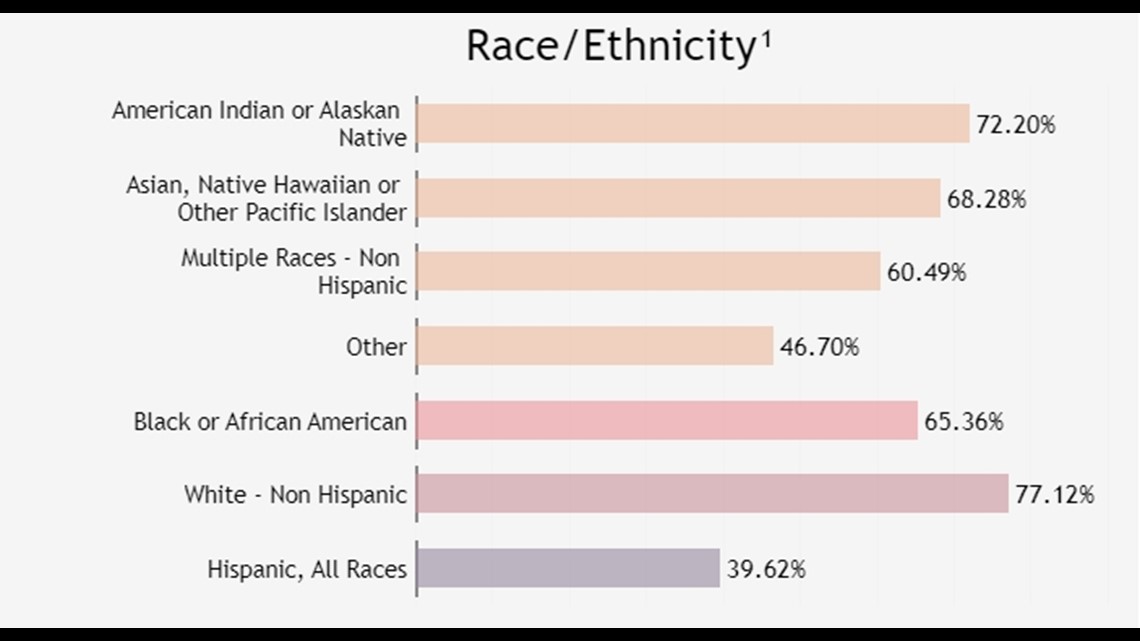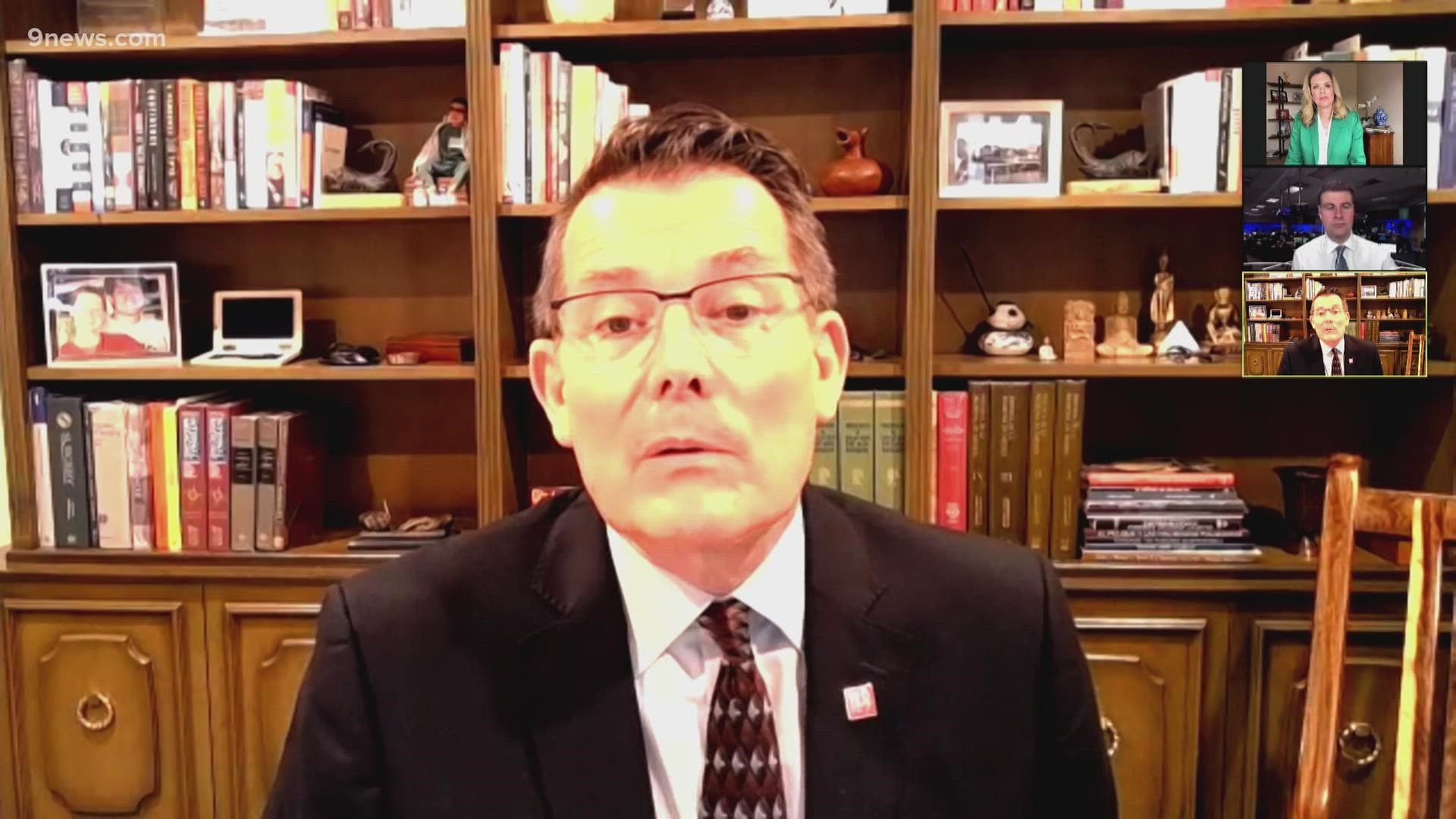COLORADO, USA — On Tuesday, the Food and Drug Administration (FDA) announced the authorization of a second booster vaccine for people over 50 or those who are immunocompromised. It is an announcement that, without a doubt, has generated questions about who is eligible to receive the vaccine and whether or not it makes sense to get it.
To answer questions and help guide Coloradans through the process of receiving their second COVID-19 booster shot, González-Fisher of Servicios de la Raza joined this week's segment with 9NEWS Watch anchor Chris Bianchi to talk about current state vaccination numbers among the Hispanic community in Colorado. Vanessa Bernal with the Colorado Department of Public Health and Environment (CDPHE) also joined them.
9NEWS: Who can get the booster?
According to Gonzalez-Fisher, the FDA approved the use of a fourth COVID-19 vaccine if you received a booster of Pfizer or Moderna. The FDA also approved the fourth dose for the vulnerable population group.
"This vulnerable population group includes, for Pfizer, children 11 years and older, for Moderna people 18 years and older who have a compromised immune system," Gonzalez-Fisher said. "For example, [due to] an organ transplant... some other situation that lowers their defenses, whether it is treatment with chemotherapy or a disease that affects the immune system.”
When can people get the booster?
According to Gonzalez-Fisher, people can begin getting their second booster if it’s been at least four months since their last vaccination.
Why should people get a fourth dose?
"This information that we had already discussed in previous weeks - studies of kidney transplant recipients in Israel... they’ve been following close to 700,000 people and they identified that there is not an increased risk by receiving a fourth dose but there is an increase in the antibodies and protection that they can get," Gonzalez-Fisher said.
Where can people get the booster shot?
Servicios de la Raza offers a weekly clinic every Tuesday from 4 p.m. to 8 p.m. at 3131 W. 14th Ave. No appointment is needed.
This week, the organization has moved it to Wednesday, at the same time above due to an event that they will be hosting simultaneously.
Mobile vaccine clinics from CDPHE will continue operations through at least June 30.
What do people need to bring or provide to get a vaccine?
González-Fisher said that during their last mobile vaccine clinic in Colorado Springs, many Colorado residents approached him with questions about whether or not a valid identification, license or social security number was needed to get a vaccine.
He wants to remind people that no documentation is required.
“They do not need to have any type of identification. They do not need to have health insurance, or they do not need to bring any proof of address. Only the information they give us is the information we record," he said.
Current COVID numbers
According to Bernal with CDPHE, these are the current numbers:
- New cases reported 205
- 20 new deaths among reported cases
- 135 people are currently hospitalized with COVID-19 of which 67% are not vaccinated
- 29 new hospital admissions
- The seven-day positivity rate is 3.33%, which is up slightly from last week. The state's goal is to keep this number below 5%.
The vaccination rate of the Hispanic population in Colorado continues to be the lowest of any other demographic group. According to the state dashboard, as of today, only 39.62% of the population is vaccinated. That's slightly up from the 39.52% last week.


Bernal mentioned last week that the number could actually be higher as the state is now taking into account a new percentage from a model that has not been used before and which could raise that number by nearly 10%.
“The reported vaccination of the Hispanic community to date is 39.61% [on Tuesday] and according to the projection model, which should be noted as we mentioned last week, there are some people who do not report their race or ethnicity, so based on this forecast, or a model, it is estimated to be 47.78%,” Bernal said.
The new study, which was developed by CDPHE and the Colorado School of Public Health, uses a model based on the Bayesian Improved Surname and Geocoding (BISG) methodology. BISG predicts race and ethnicity using a Bayesian algorithm that uses last names and location to determine the probability that an individual belongs to a given race and ethnicity.
The model uses the algorithm to best estimate the race and ethnicity of vaccinated patients who did not self-report.
In an announcement made on Tuesday, the Centers for Disease Control and Prevention (CDC) recommended a fourth dose of Pfizer-BioNTech and Moderna COVID-19 vaccines for people 50 and older and a fifth dose for individuals who are immunocompromised.
According to the release, Colorado COVID-19 vaccine providers are authorized to administer those doses now.
There are more than one million adults 50 and older in Colorado who have received a third dose who are able to get a fourth dose following the CDC announcement. The state has an estimated 470,000 doses of Moderna and Pfizer vaccines in the field across Colorado today, which are available for those eligible for both third and fourth doses.
“Coloradans age 50 and older can now get a fourth dose of the lifesaving COVID-19 vaccine, increasing their protection from this virus,” said Diana Herrero, deputy director for the Division of Disease Control and Public Health Response at CDPHE.
“We urge Congress to secure funding to purchase enough vaccine doses for all and invest in variant-specific vaccines or a pan-COVID vaccine protecting against a range of variants should the science and data demonstrate the need.”
There are more than 1,900 provider locations across Colorado, including pharmacies and doctor’s offices. The COVID-19 vaccine is free. Coloradans don’t need ID or insurance to get vaccinated and are entitled to paid time off from your job to get vaccinated and recover from any side effects.
VIDEOS SUGERIDOS: Coronavirus COVID-19

